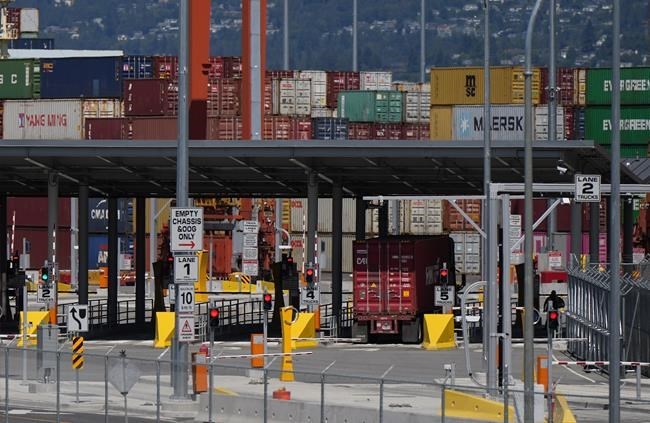VANCOUVER — The International Longshore and Warehouse Union Canada said it will meet next week to recommend the terms of a settlement deal to its membership, possibly bringing labour peace to British Columbia's ports.
The СŔ¶ĘÓƵ Maritime Employers Association said Friday the agreement to be presented to workers is the same one the union's caucus rejected just days ago.
In a statement, the association said the deal is the proposal reached with a federal mediator and was originally agreed to by both sides on July 13.
"The tentative agreement presented is the result of months of negotiations and mediation," the association statement said, adding that employers are "hopeful" the union's membership will fully ratify it when a vote is held, possibly late next week.
Workers shut down provincial port facilities for 13 days earlier this month, then returned to work only to walk off the job again briefly on Tuesday when the union's caucus rejected the mediated agreement.
Union president Rob Ashton said in a written statement that members will take the 8 a.m. shift off next Tuesday for the meeting where the deal will be presented.
News of a possible agreement broke late Thursday as the union's Local 502 said on its website that the union would hold an "emergency contract caucus" Friday to decide if the deal would be sent to a full-membership vote for ratification or rejection.
The two sides had been negotiating a new collective agreement since March but reached an impasse despite the aid of a federal mediator, triggering the strike from July 1 to July 13.
The job action by about 7,400 workers froze billions of dollars' worth of goods at Canada's key West Coast import and export points.
In a tweet sent moments after the union announcement, federal Labour Minister Seamus O'Regan thanked the union for sending the terms of the agreement to a vote.
"Right now, СŔ¶ĘÓƵ ports are operating, but we need long-term stability," he said.
The announcement capped a tumultuous week in the dispute, with the union's rejection of the agreement, an hours-long strike on Tuesday and then a decision from the Canada Industrial Relations Board that said the job action was illegal.
Workers went back to the job while the union issued 72-hour notice planned for Saturday, only to rescind it hours later.
The dispute, which disrupted operations at Canada's largest port in Vancouver, triggered vocal responses from both political and business leaders across Canada, with some, including Alberta Premier Danielle Smith, calling for back-to-work legislation.
The turbulent turn of events has left industry groups hesitant to express optimism in the union's latest announcement.
The Greater Vancouver Board of Trade paused its port shutdown calculator Friday that estimated the cost of disruptions, but declined to comment until after the union membership's vote.
The Canadian Manufacturers and Exporters said in a news release that it is cautious in its optimism that the dispute has been resolved, as the original 13-day strike damaged Canada's global reputation "as a reliable place to do business."
CEO Dennis Darby said in an interview that the organization, which has about 2,500 members, wants the federal government to make port operations an essential service "so that the solution to a labour dispute is something other than work stoppage."
"We understand collective bargaining, you have to have that, but is there a way, given that these are federally regulated facilities, could there be a way to prevent this in the future?" he asked.
Darby said businesses that rely on the ports want certainty.
"Exports make up something like 30 per cent of our GDP. It's so important because we're part of a supply chain," he said.
"Decades ago, before (the North American Free Trade Agreement), when Canada was kind of its own little island, in many senses it was different. But now the North American business, global business, they rely on the fact that movement of goods is normally pretty seamless."
Darby said that if the deal isn't ratified, Ottawa will need to step in.
"If they can't come up with a solution using the tools they have now, we would support back-to-work legislation," he said.
"I hope it doesn't come to that."
This report by The Canadian Press was first published July 21, 2023.
Chuck Chiang and Ashley Joannou, The Canadian Press





